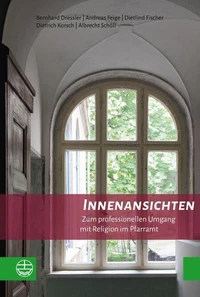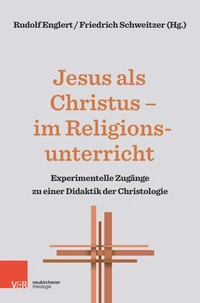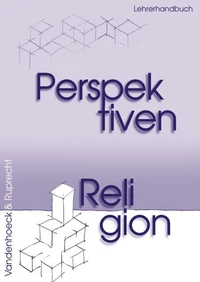Religionsunterricht. Bildungstheoretische Grundlegungen
Par :Formats :
Disponible dans votre compte client Decitre ou Furet du Nord dès validation de votre commande. Le format PDF est :
- Compatible avec une lecture sur My Vivlio (smartphone, tablette, ordinateur)
- Compatible avec une lecture sur liseuses Vivlio
- Pour les liseuses autres que Vivlio, vous devez utiliser le logiciel Adobe Digital Edition. Non compatible avec la lecture sur les liseuses Kindle, Remarkable et Sony
 , qui est-ce ?
, qui est-ce ?Notre partenaire de plateforme de lecture numérique où vous retrouverez l'ensemble de vos ebooks gratuitement
Pour en savoir plus sur nos ebooks, consultez notre aide en ligne ici
- Nombre de pages332
- FormatPDF
- ISBN978-3-374-05595-1
- EAN9783374055951
- Date de parution01/11/2018
- Protection num.Digital Watermarking
- Taille3 Mo
- Infos supplémentairespdf
- ÉditeurEvangelische Verlagsanstalt
Résumé
Der Religionsunterricht ist an deutschen Schulen in seiner Form als konfessioneller Religionsunterricht zwar de jure garantiert, aber de facto umstritten. In den Erziehungswissenschaften genießt er keine rückhaltlose Zustimmung. Deregulierungen durch rechtliche Grauzonen vermehren sich. Gegenwärtig spitzen sich die Widersprüche zu: Während sich die Etablierung eines islamischen Religionsunterrichts allgemein abzeichnet, geraten evangelische und katholische Religionsunterrichtsangebote unter Druck, unter anderem durch wachsende Teilnahmezahlen an den Alternativfächern Ethik oder Praktische Philosophie.
Plädoyers für christlichen Religionsunterricht in konfessioneller Kooperation stoßen auf zögernde Resonanz. Umso dringlicher ist eine zeitgemäße bildungstheoretische Grundlegung des Religionsunterrichts und eine Religionsdidaktik, die es mit den didaktischen Standards anderer Schulfächer aufnehmen kann. [Religious Instruction. Education-Theoretical Foundations] Religious instruction at German schools is ensured de jure but contested de facto.
In the educational sciences it does not enjoy unreserved approval. Deregulations because of legal grey areas can be observed. Currently contradictions are increasing: while an Islamic religious instruction is becoming generally established, Protestant and Catholic religious instruction is under pressure because of a growing number of students who choose the alternative subjects ethics or practical philosophy, but also because of appeals for a Christian religious instruction in confessional cooperation.
Therefore, a education-theoretical foundation of religious instruction is all the more urgent, as well as a didactics of religion that could compete with the didactical standards of other school subjects.
Plädoyers für christlichen Religionsunterricht in konfessioneller Kooperation stoßen auf zögernde Resonanz. Umso dringlicher ist eine zeitgemäße bildungstheoretische Grundlegung des Religionsunterrichts und eine Religionsdidaktik, die es mit den didaktischen Standards anderer Schulfächer aufnehmen kann. [Religious Instruction. Education-Theoretical Foundations] Religious instruction at German schools is ensured de jure but contested de facto.
In the educational sciences it does not enjoy unreserved approval. Deregulations because of legal grey areas can be observed. Currently contradictions are increasing: while an Islamic religious instruction is becoming generally established, Protestant and Catholic religious instruction is under pressure because of a growing number of students who choose the alternative subjects ethics or practical philosophy, but also because of appeals for a Christian religious instruction in confessional cooperation.
Therefore, a education-theoretical foundation of religious instruction is all the more urgent, as well as a didactics of religion that could compete with the didactical standards of other school subjects.
Der Religionsunterricht ist an deutschen Schulen in seiner Form als konfessioneller Religionsunterricht zwar de jure garantiert, aber de facto umstritten. In den Erziehungswissenschaften genießt er keine rückhaltlose Zustimmung. Deregulierungen durch rechtliche Grauzonen vermehren sich. Gegenwärtig spitzen sich die Widersprüche zu: Während sich die Etablierung eines islamischen Religionsunterrichts allgemein abzeichnet, geraten evangelische und katholische Religionsunterrichtsangebote unter Druck, unter anderem durch wachsende Teilnahmezahlen an den Alternativfächern Ethik oder Praktische Philosophie.
Plädoyers für christlichen Religionsunterricht in konfessioneller Kooperation stoßen auf zögernde Resonanz. Umso dringlicher ist eine zeitgemäße bildungstheoretische Grundlegung des Religionsunterrichts und eine Religionsdidaktik, die es mit den didaktischen Standards anderer Schulfächer aufnehmen kann. [Religious Instruction. Education-Theoretical Foundations] Religious instruction at German schools is ensured de jure but contested de facto.
In the educational sciences it does not enjoy unreserved approval. Deregulations because of legal grey areas can be observed. Currently contradictions are increasing: while an Islamic religious instruction is becoming generally established, Protestant and Catholic religious instruction is under pressure because of a growing number of students who choose the alternative subjects ethics or practical philosophy, but also because of appeals for a Christian religious instruction in confessional cooperation.
Therefore, a education-theoretical foundation of religious instruction is all the more urgent, as well as a didactics of religion that could compete with the didactical standards of other school subjects.
Plädoyers für christlichen Religionsunterricht in konfessioneller Kooperation stoßen auf zögernde Resonanz. Umso dringlicher ist eine zeitgemäße bildungstheoretische Grundlegung des Religionsunterrichts und eine Religionsdidaktik, die es mit den didaktischen Standards anderer Schulfächer aufnehmen kann. [Religious Instruction. Education-Theoretical Foundations] Religious instruction at German schools is ensured de jure but contested de facto.
In the educational sciences it does not enjoy unreserved approval. Deregulations because of legal grey areas can be observed. Currently contradictions are increasing: while an Islamic religious instruction is becoming generally established, Protestant and Catholic religious instruction is under pressure because of a growing number of students who choose the alternative subjects ethics or practical philosophy, but also because of appeals for a Christian religious instruction in confessional cooperation.
Therefore, a education-theoretical foundation of religious instruction is all the more urgent, as well as a didactics of religion that could compete with the didactical standards of other school subjects.





